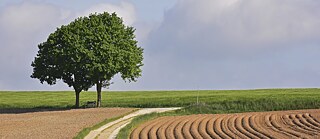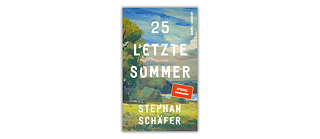Cherrypicker | Literature
Invitation to take a deep breath

Taking a break from life and exploring it anew - Stephan Schäfer's novel does just that. He tells the story of two strangers who become friends. In doing so, he speaks not only to himself, but to us all.
By Sina Bahr
"Well, did you fall out of bed too?" It is early in the morning when the first-person narrator in 25 letzte Sommer (25 Last Summers) meets Karl, a man with cheeky eyes who has just stepped out of the lake naked. "No, more like out of life," replies the first-person narrator, marvelling at his own honesty. A first taste of the special effect Karl will have on him this weekend.

The joy of doing nothing
As is so often the case, the weekend in the country is a miserable attempt by the first-person narrator to finally find peace and quiet. "I rarely found it, usually only for a few moments, because it was hardly ever quiet in my head, work was always invisible in my luggage." The constant availability gnaws at him, not even the silence of nature can drive away the thoughts of his obligations. In the hectic pace of his everyday life, he has simply lost the joy of doing nothing.Until he meets potato farmer Karl on his Saturday morning run. He takes him to his farm and into his decelerated life. Whether in the field among the potatoes, in his library among the books or at the dining table among sinful delicacies - Karl asks the right questions that make it easy for the first-person narrator to open up. He shows him what inner peace looks like: Sleeping and feasting without remorse are part of it, lazy Sundays, a natural balance of creating and relaxing. Karl gradually teaches him everything that the first-person narrator has forgotten.
The dilemma for all of us
But it is not as if he has never been able to do all of this before, as if he does not realise the importance of these things. Living a conscious life in the moment - that's what he once set out to do. The fact that he just can't manage it between work and stress makes him an approachable hero of the novel. Because many readers are familiar with his dilemma. On the one hand, there is the rarely questioned career path from school to further education to the world of work, which promises financial security and prestige - and on the other, the desire to follow his inner voice and spend his precious time with people he loves.The first-person narrator is like all those who try in vain to find a sweet spot in between. Karl seems to have found his, but the search was not easy for him either. He reveals his own story to the first-person narrator, talks about setbacks and difficult decisions. It soon becomes clear that the two men are not as different as they seem at first glance.
Literary reappraisal of one's own new beginning
Stephan Schäfer has succeeded in creating two authentic characters because his own experiences are reflected in them. "I wanted to give my life a turn through the written word," says the author in an interview with NDR Kultur. The book is the literary reappraisal of his own new beginning. Two years ago he left his managerial job and wrote his first novel. Since then he has been asking himself what kind of person he wants to be. "I think it's a nice question, and it doesn't have anything difficult for me, but I have the feeling that as the years go by I'm slowly living into the answers."These are questions that Stephan Schäfer raises in his novel, but it is up to the reader to answer them for themselves. The book provides the right impetus for this. Anyone reading 25 letzte Sommer becomes part of a dialogue between friends who were just strangers, is whisked away to a place full of serenity, is invited to take a deep breath and encouraged to rethink their own priorities. Will the first-person narrator organise his last 25 summers in the same way as he did that weekend with Karl? One can only wish him the same.
Berlin : park x ullstein, 2024. 169 p.
ISBN: 978-3-98816-009-6